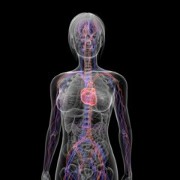 Photo: Getty Images
Photo: Getty Images
In today’s health conscious society, more and more people are turning to “natural” or alternative remedies for improved health. After all, if it’s natural, then it must be good for you - right? Well, maybe and maybe not. One of the supplements recently under examination is the use of pine bark extract to improve heart health.
Pine bark extract is just what it sounds like - an extract made from the bark of a pine tree (specifically the maritime pine from the western area of the Mediterranean). Pine bark extract (currently sold under the name of Pycnogenol) contains proanthocyanidins. In addition, it’s believed that pine bark extract is a powerful antioxidant.
Pine bark extract is believed by many to possess antioxidant properties. Antioxidants provide protective benefits by protecting against the damage caused by free radicals. Left unchecked, free radical damage leads to plaque formation as well as increases in levels of low-density lipoprotein (LDL or “bad”) cholesterol. High LDL cholesterol levels and plaque buildup are risk factors for the development of heart disease. Because of its antioxidant properties, it’s thought that pine bark extract protects the user from health conditions such as: heart disease, cancer, and diabetes. It’s also believed to improve circulatory (swelling/varicose veins) issues, flexibility, memory, and reduce inflammation.
Despite many “believers” in the protective and beneficial qualities of pine bark extract, the medical profession remains unconvinced. According to one study conducted at the Stanford University School of Medicine, pine bark extract, while safe, may not have any protective heart benefits at all.
The 12-week study consisted of 130 participants, all of whom were at risk for heart disease. Half the participants were given a placebo while the other half were given 200 mg of pine bark extract daily. Baseline assessments for heart risk factors, including blood pressure, cholesterol levels, body mass index, C-reactive protein marker levels, fasting glucose levels, and so forth, were established at the beginning of the study. Participants were then re-evaluated at the mid-point of the study (6 weeks) and at the end (12 weeks). At the end of the 12-week study, researchers did not find a significant difference between the placebo group and the group receiving pine bark extract.
At the end of the day, researchers concluded that although pine bark extract appeared to be safe, no improvement of heart disease risk factors was observed. It should be noted that this was a small, limited trial and even researchers admit that a different dosage might have produced a different result. At present, very few clinical studies have been conducted which have led to support (either positive or negative) regarding the benefits of using pine bark extract.
The complete results can be reviewed in the September 27, 2010 issue of Archives of Internal Medicine.
Mary Kyle is a freelance writer, editor, and project manager. She has a Master of Arts in Legal Studies, a Bachelor of Music, and multiple professional certifications in project management. In addition to health advocacy, she is passionate about literacy and volunteers in local schools teaching writing seminars and reading.
Sources:
Arch Intern Med. 2010;170[17]:1541-1547. Available pre-embargo to the media at www.jamamedia.org.)
No cardiovascular benefit observed for pine-bark extract, Breakthrough Digest, 26 Sept 2010, http://www.breakthroughdigest.com/medical-news/no-cardiovascular-benefit-observed-for-pine-bark-extract/
Pine Bark Extract, American Cancer Society, http://www.cancer.org/Treatment/TreatmentsandSideEffects/ComplementaryandAlternativeMedicine/HerbsVitaminsandMinerals/pine-bark-extract





Add a CommentComments
There are no comments yet. Be the first one and get the conversation started!